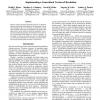Free Online Productivity Tools
i2Speak
i2Symbol
i2OCR
iTex2Img
iWeb2Print
iWeb2Shot
i2Type
iPdf2Split
iPdf2Merge
i2Bopomofo
i2Arabic
i2Style
i2Image
i2PDF
iLatex2Rtf
Sci2ools
AAAI
2004
2004
Implementing a Generalized Version of Resolution
We have recently proposed augmenting clauses in a Boolean database with groups of permutations, the augmented clauses then standing for the set of all clauses constructed by acting on the original clause with a permutation in the group. This approach has many attractive theoretical properties, including representational generality and reductions from exponential to polynomial proof length in a variety of settings. In this paper, we discuss the issues that arise in implementing a group-based generalization of resolution, and give preliminary results describing this procedure's effectiveness.
AAAI 2004 | Attractive Theoretical Properties | Augmented Clauses | Intelligent Agents | Polynomial Proof Length |
Related Content
| Added | 30 Oct 2010 |
| Updated | 30 Oct 2010 |
| Type | Conference |
| Year | 2004 |
| Where | AAAI |
| Authors | Heidi E. Dixon, Matthew L. Ginsberg, David K. Hofer, Eugene M. Luks, Andrew J. Parkes |
Comments (0)

